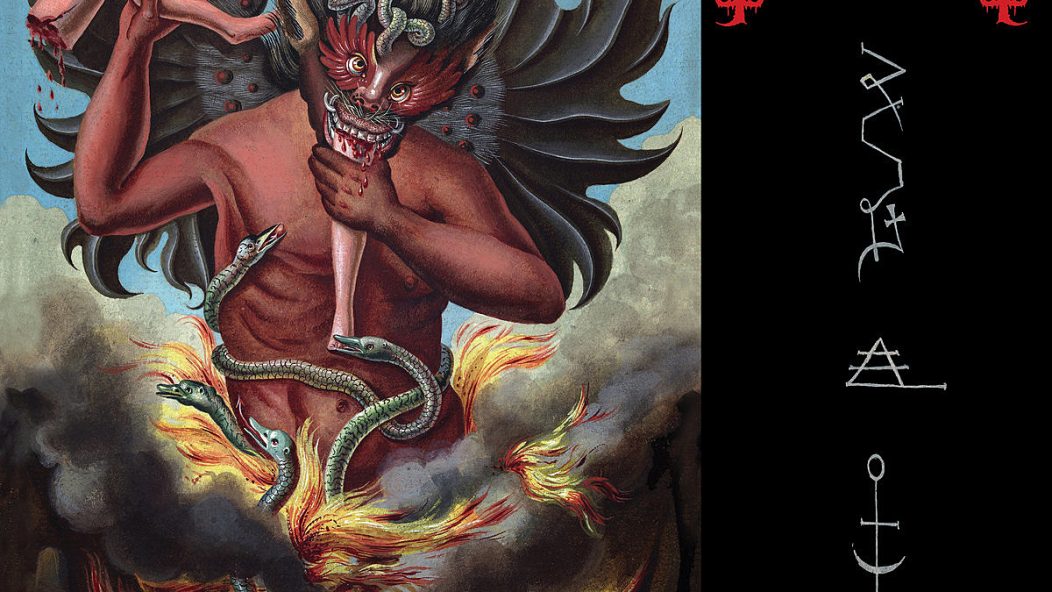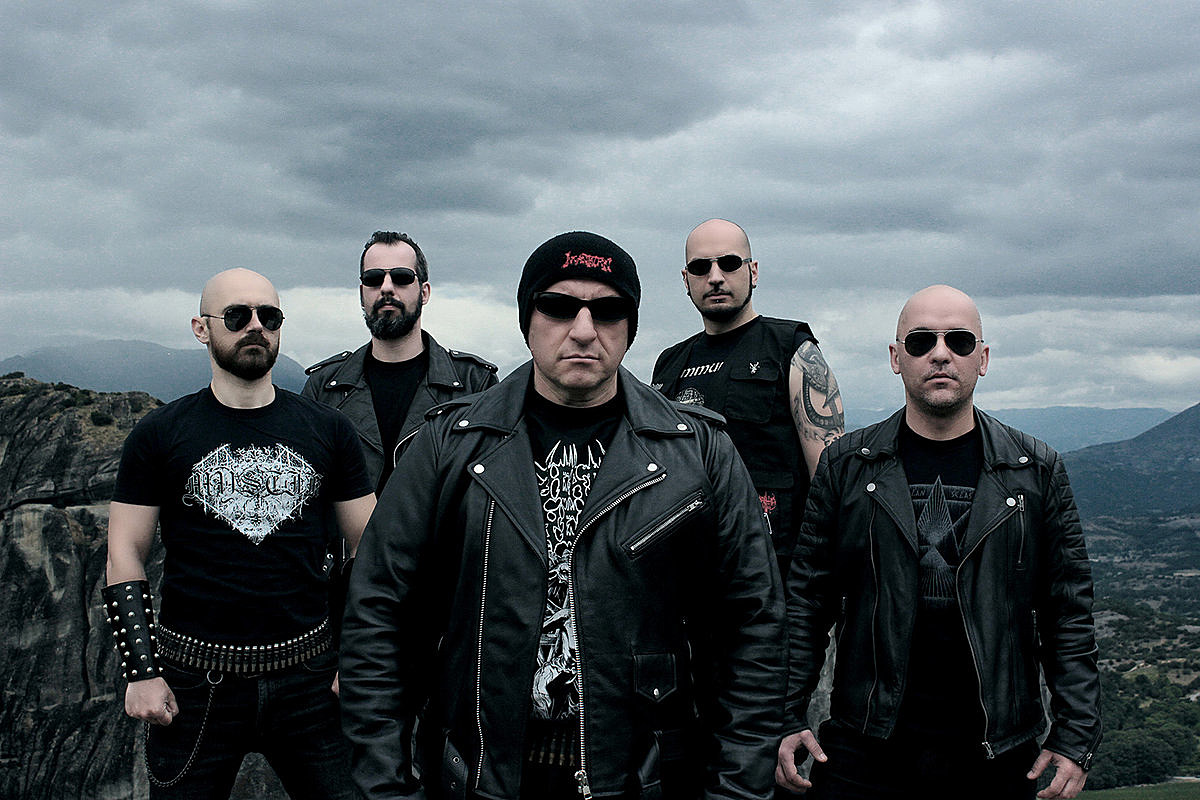
Hunting Greatness: Katavasia's Achilleas Talks Greek Black Metal and "Magnus Venator"
Greek has a storied history with black metal, and progenitors like Varathron, Rotting Christ, and Necromantia pioneered what’s known now as the Hellenic black metal sound about thirty years ago. For the uninitiated looking for a briefer introduction than the monstrous guide I linked there, Hellenic black metal was a lot warmer than their Norwegian counterparts, and much more directly influenced by the heavy metal and thrash that came before them – enough that Rotting Christ and Varathron collectively covered bands like Mercyful Fate, Black Sabbath, Death Courier, and Kreator more than they did bands in their own genre.
As a fan of the primordial soup of pre-Norwegian black metal and as a bigger fan of heavy metal, Hellenic black metal has always been a particular favorite of mine. Though the style has had its ups and downs, it’s once again somewhat popular in the underground, and two members of Varathron came together a few years ago to form Katavasia, an adherent of the old mysteries that evokes the same feeling as the earliest days of the old Hellenic scene.
…
…
Katavasia’s 2015 debut Sacrilegious Testament was pretty good, but this year they released Magnus Venator, and it’s everything I wanted the first one to be. Glorious melodies, sections with more intimate atmosphere, and memorable songwriting combine to create what’s turned out to be my favorite black metal album of the year. Everything that was good about the first album has been improved upon, and anything boring has been excised; there’s a lot of good Hellenic black metal out there these days, but this is amongst the best of the current wave of it.
After listening to the new album a bunch, I decided that I had to know more, and the band’s guitarist/bassist Achilleas sat down to answer some questions for us.
– Brandon Corsair
…

…
Hello Achilleas, thanks for doing this interview with Invisible Oranges! To start off, Katavasia dropped its sophomore album, Magnus Venator, on Floga Records a couple of months ago. How has the reception been compared to 2015’s Sacrilegious Testament?
Thanks for having me Brandon! Magnus Venator has exceeded expectations for sure. Both people, and press have been really supportive and excited with the album. Sacrilegious Testament had great feedback as well but with Magnus Venator our music is being listened by far more people that weren’t particularly familiar with Hellenic BM.
Are there any differences between the two albums that you think fans might not pick up on?
I think Magnus Venator is a much more aggressive and “modern” in many ways album. The production is more shiny for sure too. When we started this project the idea was to create a band that represents the best of 1990s Hellenic black metal. I believe this time we created something much more original and manage to bring that same vibe to a much more personal style. Also I think that in this album, Stefan Necroabyssious did his best performance ever.
How much of the time between the release of the album and 2017’s Daemonic Offering 7” was spent songwriting for Katavasia versus for your other bands?
We decided to create Katavasia to have fun and compose music in a more spontaneous way. We spent much less time on overthinking everything. It is also important for me that I am not the main composer on Katavasia, I do most of the arrangements and finishing touches as a producer but most of the riffs come from Astrous and now Dimitris as well. That helps me out focusing on the production and move faster in general. Working on a Katavasia album is more or less three months job which is honestly not that much. We have a great creative flow!
You play in two bands that I’m aware of outside of Katavasia- the progressive/experimental black metal group Aenaon and the legendary Varathron. How do you divide your time between the three?
Katavasia started as a studio project, not a live band. Aenaon is a much more complicated band but the thing is that we no longer perform live shows too since we can’t afford it. Living away from each other makes it very difficult to rehearse. On the other hand, Varathron is a big band nowadays and we get to play a lot of live shows and tour as well whenever we can. It’s the most time demanding band for me and I also produce and compose most of the music. Anyway, the point is that every few years we record an album with each band, there’s always time to focus on each one separately without much pressure since only Varathron perform live and have to keep a tight schedule with discography.
When you joined Varathron you were only 17 years old, and a couple of years later you formed Aenaon. Some sixteen years later, how has your songwriting evolved? Do you feel like you’re more capable now of expressing yourself musically than when Cendres et sang or Stygian Forces of Scorn came out?
Actually I joined Varathron when I was 16 but recorded Crowsreign a year later since I was just a kid and needed time to spend with Stefan and prepare the album. Songwriting now and then is completely different for me. Composing, producing and expressing myself through music is vital and natural for my everyday routine. Also, age is important for every man. The way I compose now –16 years later – feels much more mature and confident.
Aenaon’s differences from Varathron are obvious, but Katavasia shares many similarities, and Stefan even fronts both Varathron and Katavasia. What inner need does Katavasia fill that Varathron doesn’t, and what separates the two when songwriting?
You are right, that is a good question. Before answering I’d like to say that all of these years I have get to know so many Scandinavian underground artists that play with three or four bands of the exact, same style. People are much more used to Scandinavian sounds and it’s easier for them to distinguish the details that make a difference among these bands, while in Greek sound for example, everyone will say “that sounds like Rotting Christ” and that’s because that’s the only band coming from Greece they know. Now to your question: With Katavasia there’s a different main composer and three different members. When we started Katavasia, Varathron had just released Untrodden Corridors… which was nothing like Katavasia. After Patriarchs of Evil the two bands are indeed much more close to each other’s style but again: different members involved and for me it’s also great because I get to play the bass with Katavasia. Anyway, different people, different chemistry, different ways to experiment with each band and there’s creative hunger for both!
Katavasia is much more traditional in approach than Aenaon; is there ever any bleed-through in either band when putting together music? Are they completely distinct to you or facets of the same thing?
Aenaon is completely different and the new album that’s now coming is even more bizarre and progressive. With Aenaon whatever idea comes to mind I am free to do it while with Katavasia and Varathron there are some “rules” you just can’t ignore. The only hard thing for me when composing for Aenaon is that I have to change my mindset completely and then change it back again to Varathron/Katavasia. Once the mindset is changed everything is smooth but sometimes it needs a little bit more effort.
What keeps drawing you again and again across the years to the ancient Greek sound as you start bands and write music?
When I was younger I always struggled to be more cold and more “evil”. Now that I grew up and feel confident with my creations, the Mediterranean sound and other scenes around the world feel to have much more to give me back. There are much more dimensions in darkness than what – for example – the Norwegian BM scene has provided to us and proclaimed to be “true”. So, to answer your question, I feel that the sound of Hellenic BM is really what comes out of my heart naturally.
You’ve personally produced both Katavasia albums, as well as many others in the Hellenic black metal scene. How did you get started with audio work? Does your audio experience ever impact your songwriting or decisionmaking for your bands?
Naturally I started working on sound as a need to record my music. Later I was also driven to audio engineering and in general more technical stuff. Producing and creating art is my main purpose, not sound engineering. I think the only downside of being a sound engineer and musician at the same time is that you lose a little bit of the magic in your mind and some times you have to lose some of the creative energy to the engineering stuff. Over the years I still continue to compose and produce good music so hopefully the impact is quite positive.
Katavasia is the rare band that didn’t release a demo before your first album. What led to the decision to come out of the gate with Magnus Venator instead of starting with something less ambitious?
Recording a demo before the internet/computers era was as hard as recording an album nowadays. Anyone with a computer and a software can release an “album” or a “single” on YouTube now. Recording an album with Katavasia didn’t feel that ambitious with the experience we already have. Times have changed.
How did you guys get in touch with Floga Records, who have released all of Katavasia’s material? Do you think you’ll ever work with another label again?
Astrous and I work for Floga Records. He is the label’s graphic designer and I am the audio guy. We are friends and coworkers with George from Floga so he is like a member of the band in a way. I don’t know if we’re ever going to change label but I don’t feel like there’s any need of thinking about that right now.
What’s next for Katavasia?
We’re going to release a seven-inch split with another Greek BM band in a few months. Our song is already mixed and mastered so we’re just waiting for them to proceed. Meanwhile, Astrous and Dimitris are starting working on some new Katavasia demos.
Do you have anything you’d like to talk about or promote?
Not really! Thank you for the nice questions and genuine interest!
…
Magnus Venator released September 4th, 2020 via Floga Records.
Support Invisible Oranges on Patreon and check out our merch.










